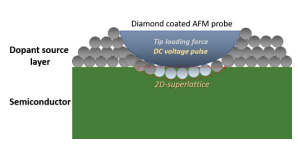2021-09-20 アメリカ合衆国・サンディア国立研究所(SNL)

・ SNL、スウェーデン・オングストローム研究所および英国・ノッティンガム大学が、機械学習(ML)技術によるモデル化を通じ、優れた水素吸蔵特性を有する高エントロピー合金(HEA)について解明。水素社会の基盤構築を促進して水素エネルギー実用化の加速を支援する。
・ 同 ML モデルは、莫大な高エントロピー合金(HEA)空間におけるハイドライド(水素化合物)の安定性を迅速にスクリーニングし、熱力学的特性のみならず合金相の安定性や密度等の二義的な条件をベースとした研究室での評価に向けた絞り込みを促進する。
・ 水素吸蔵の研究や水素と材料間の相互作用を示す熱力学値のデータベース構築には、膨大な蓄積がある。これらのデータベース、ML と各種計算ツールや最先端の実験能力を駆使した国際研究チームの研究活動により、12 種類の新合金の作製と数百種類のモデリングを実施し、水素と金属間の相互作用で起こる複雑な物理的・化学的現象が ML 技術でモデル化できることを実証した。
・ 熱力学的特性を予測するデータ駆動のモデリング能力は、研究開発の加速に役立つもの。ML モデルの構築・訓練後は、新たな化学空間の高速スクリーニングが可能となる。今回、水素吸蔵・輸送で有望な 600 種類の材料のスクリーニングを 18 ヶ月で完了。ML を利用しない場合は数年間を要する。
・ 通常、水素は機械的なプロセスで圧縮されるが、HEA ハイドライドの複数層から成る貯蔵タンクでは、注入された水素が各層で段階的に圧縮されるため、1 バールで注入して 800 バールで取り出すことが理論的に可能。水素ステーションで 700 バールの水素を FC 車に注入するには 800 バール以上の圧縮が必要。
・ 今回のモデルについてさらに改良を進めているが、米国エネルギー省(DOE)がデータベースを一般公開しているため、同手法への理解が進むことで ML の活用が材料科学を始め多岐にわたる分野におけるブレイクスルーをもたらす可能性がある。
・ 本研究は、DOE の水素燃料電池技術所(HFTO)、エネルギー効率・再生可能エネルギー局(EERE)および SNL の Laboratory Directed Research and Development プログラムが支援した。
URL: https://newsreleases.sandia.gov/fast_alloys/
<NEDO海外技術情報より>
(関連情報)
Chemistry of Material 掲載論文(アブストラクトのみ:全文は有料)
Data-Driven Discovery and Synthesis of High Entropy Alloy Hydrides with Targeted Thermodynamic
Stability
URL: https://pubs.acs.org/doi/10.1021/acs.chemmater.1c00647
Abstract
Solid-state hydrogen storage materials that are optimized for specific use cases could be a crucial facilitator of the hydrogen economy transition. Yet, the discovery of novel hydriding materials has historically been a manual process driven by chemical intuition or experimental trial and error. Data-driven materials’ discovery paradigms provide an alternative to traditional approaches, whereby machine/statistical learning (ML) models are used to efficiently screen materials for desired properties and significantly narrow the scope of expensive/time-consuming first-principles modeling and experimental validation. Here, we specifically focus on a relatively new class of hydrogen storage materials, high entropy alloy (HEA) hydrides, whose vast combinatorial composition space and local structural disorder necessitate a data-driven approach that does not rely on exact crystal structures to make property predictions. Our ML model quickly screens hydride stability within a large HEA space and permits down selection for laboratory validation based on not only targeted thermodynamic properties but also secondary criteria such as alloy phase stability and density. To experimentally verify our predictions, we performed targeted synthesis and characterization of several novel hydrides that demonstrate significant destabilization (70× increase in equilibrium pressure, 20 kJ/molH2 decrease in desorption enthalpy) relative to the benchmark HEA hydride, TiVZrNbHfHx. Ultimately, by providing a large composition space in which hydride thermodynamics can be continuously tuned over a wide range, this work will enable efficient material selection for various applications, especially in areas such as metal hydride-based hydrogen compressors, actuators, and heat pumps.



